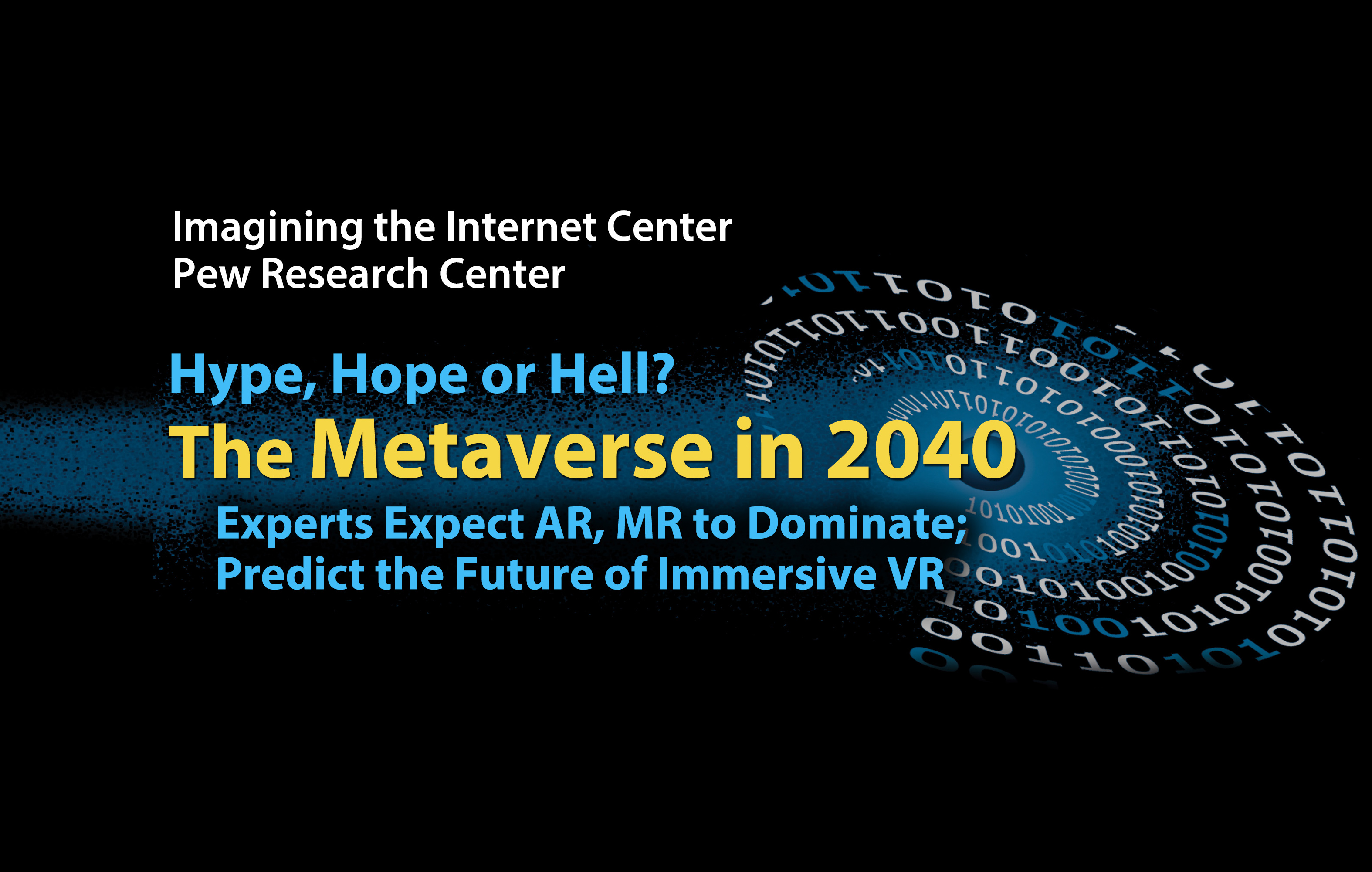The new survey of experts focuses on the potential impact of extended reality technologies.
The evolution of technology to extend the bounds of reality – creating a multidimensional world known as the metaverse – has experts pondering its potential benefits and drawbacks for humanity. Many predict that augmented- and mixed-reality enhancements will become more useful in our daily lives in the next 18 years than fully-immersive virtual reality. Some warn that the problems arising from today’s uses of online tools may pose even greater threats when digital life becomes even more all-encompassing.
More than 600 experts’ views of this potential future are explored in a new report by Pew Research Center and Elon University’s Imagining the Internet Center. Access the full report here.
This report is part of a long-running series about the future of digital life. It is based on a nonscientific canvassing of technology innovators, developers, business and policy leaders, researchers and activists who were asked to consider the trajectory and impact of the metaverse by 2040. In all, 624 respondents shared their views, 54% of saying they expect by 2040 the metaverse will be a much-more-refined and truly fully-immersive, well-functioning aspect of daily life for a half billion or more people globally, and 46% said that they expect that will not happen.

“Two leading themes emerged from these experts’ responses,” said Janna Quitney Anderson, professor of communications and executive director of the Imagining the Internet Center. “First, many expect full virtual reality (VR) to remain primarily a niche space for gaming and entertainment – that it will not be as well-developed and broadly embraced in people’s daily lives by 2040 as augmented-reality (AR) tools that people can simply and easily use to create information layers in the real world.
“And second, a notable share warned that extended reality (XR) tools could dramatically magnify every human trait and tendency – both the bad and the good. They said current problems with social media could be magnified, especially if the development of XR is led by the mega-tech companies that own and operate most of the most-visited public spaces on the Web today. They also worry about the ability of those in control of these digital systems to shape what people do and stifle their ability to self-actualize through the exercise of their own free will,” Anderson said.
Metaverse terminology
- Extended reality (XR) is an umbrella term encompassing the various forms of computer-altered reality. Other terms fall under the XR umbrella:
- Virtual reality (VR) completely immerses people in a digital setting. These settings can be created as fully synthetic computer-generated content, they can be made of real-world content (set in actual 360-degree video), or they can be a hybrid of both. Today’s fullest home or work VR experiences require individuals to use a head-mounted device and haptic controllers.
- Augmented reality (AR) overlays real-world settings with digital information. You are applying AR when you use your phone’s camera to translate signs and menus in real time from one language to another. AR keeps the real world central but enhances it with digital details that supplement the environment.
- Mixed reality (MR) experiences allow people to interact with and manipulate computer-generated images in the real world, in real time. You use a headset but see and remain immersed in the real world while seeing and interacting with images using your hands – for instance, a 3D architectural floor plan for a new building.
Survey findings
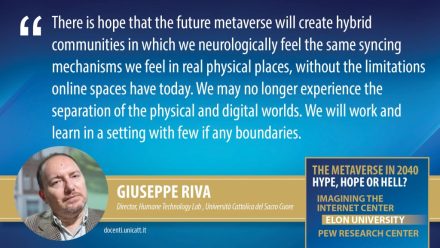 Experts in this report were invited to detail their views about both the positive and negative aspects of the metaverse.
Experts in this report were invited to detail their views about both the positive and negative aspects of the metaverse.
The key themes are outlined in the following three tables.
- The first table outlines further details tied to the two broad themes mentioned above.
- The second describes the five most-mentioned reasons shared by experts who believe the metaverse is likely to be much more advanced and more broadly adopted by 2040.
- The third describes the five most-mentioned reasons shared by experts predicting the metaverse is not likely be much more refined and more broadly adopted by 2040.
Source: Nonscientific canvassing of select experts conducted Feb. 11–March 21, 2022. “The Metaverse in 2040” by Pew Research Center and Elon University’s Imagining the Internet Center
TABLE ONE
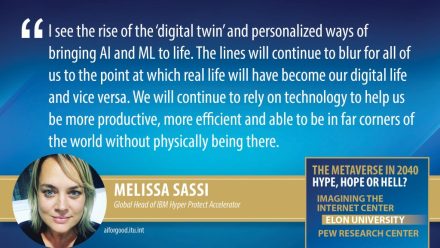
Two overarching insights about the future of the metaverse
These themes anchored many experts’ predictions as they considered the metaverse in 2040:
- Augmented- and mixed-reality applications will dominate over virtual-reality advances: Some argued that the most-popular technological enhancements will be tied to augmented reality (AR) and mixed reality (MR), enabled by artificial intelligence (AI) systems. They said people will find those advances particularly appealing because they will expand upon real-world experiences and improve users’ daily lives by making reality more understandable and interesting. Most of these experts said they expect that broader adoption of virtual reality (VR) will be limited to enthusiastic but smaller user bases, especially gamers and entertainment seekers and in select business, medical, education and training settings.
- The next-generation networked-knowledge ecosystem can be built in ways that better serve people than the current web does: A share of these experts argued that coming tech advances in metaverse technologies will magnify all human activities, including the problems now associated with the current Web 2.0 environment. They said the immersive properties of the metaverse could raise significant threats to human agency and human rights as “surveillance capitalism” expands and authoritarian governments take advantage of these new technologies.
TABLE TWO
Five insights from those who predict the metaverse will be significantly advanced by 2040
Half of the expert respondents to this canvassing said extended-reality (XR) applications and the networking needed to facilitate their broad adoption will advance significantly by 2040. They expect that extended reality will be much more sophisticated by then due to these factors:
- Profit motives are driving significant investment in advancing these technologies: The primary force driving investment in technological development has always been the opportunity for people to profit from its success. Expect rapid development of XR because of its massive commercial potential.
- Compared with today, far more people will find the metaverse useful enough to access it daily: Those who expect XR to advance significantly by 2040 believe it will be broadly adopted in many realms in addition to its current niches. As with any technology, the use cases include positives and negatives.
- The technology to create an immersive universe is possible by 2040: Yes, software, hardware, user interfaces and network capability could be advanced enough within the next 18 years to make a much-improved, more broadly adopted metaverse possible.
- The pandemic gave XR development a big boost: Experiences during the COVID-19 pandemic have accelerated demand for and investment in new and improved online tools, especially in health, business and educational settings.
- There are any number of potential positive and delightful uses of XR: These experts highlighted a wide-ranging number of activities and services that could be offered in metaverse spaces, including rich learning experiences; remote medical procedures; disaster-response flexibility; creation of new kinds of communities; expanded venues for commercial exchanges; a flowering of creativity in the arts and fashion; fully automated encounters with smart agents handling such things as accounting, professional training and mental health counseling; interactions with famous people; playing-field experiences with prominent athletes; and travel to exotic and fun locales (e.g., archeological digs, mountaintops, historic scenes, beaches, museums, far-off galaxies and other-worldly places).
TABLE THREE
Five insights from those who predict the metaverse will not advance significantly by 2040
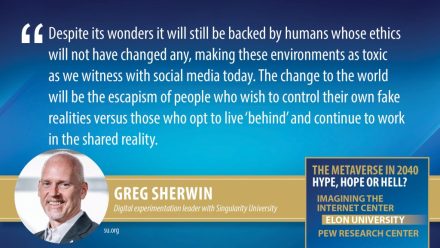 About half of the expert respondents said advances in full-immersion XR settings will not come to widespread use in people’s daily lives by 2040. They made these arguments:
About half of the expert respondents said advances in full-immersion XR settings will not come to widespread use in people’s daily lives by 2040. They made these arguments:
- It will not be seen as useful in daily life: A portion of these experts pointed out that quite a few immersive augmented and/or virtual spaces already exist and are only attracting niche participants. They contend the considerable majority of people will not see enough life-enhancing use cases in the prospects of fuller XR to want to become more fully immersed.
- The technology needed to reach a lot more people will not be ready in 2040: Upgrades in software, hardware, user interfaces and network capability will not be advanced enough to lure mass audiences into fuller immersion by 2040. The gear is likely to remain less than user-friendly, large spaces are required to maneuver in VR, and there will continue to be problems with network latency and bandwidth.
- People prefer living in layers of ‘real’ reality: Most people will continue to find full immersion in VR unappealing – not just due to clunky equipment, high cost or bad connectivity, but because they don’t want to be immersed, preferring being mostly absorbed in the real world.
- Public worries about the impact of surveillance capitalism and abuse by authoritarian regimes will slow or stop adoption: A number of these experts predict that people will not be willing to invest their time and energy in virtual spaces in which they can be further manipulated and surveilled by corporate and/or authoritarian interests.
- There are any number of threatening and harmful uses of XR: These experts noted a number of problems that may worsen or arise in metaverse spaces, including reductions in autonomy and people’s ability to control their lives; worsening digital divides; amplified discrimination; new forms of harassment, bullying and hate; new menaces to public safety, especially around sexual violence and exploitation; more avenues for misinformation (especially tied to clever fakes); deeper levels of addiction to metaverse activities; distractions that dissociate people from real life and induce loneliness (or worse); new threats to users’ personal data; and further commercialization and further monetization of basic human activities.
Among the most intriguing predictions from those canvassed were the following:
- Avi Bar-Zeev said digital systems will perform ever-more-sophisticated analyses of how people think and feel about people and other elements of their lives, their private political and spiritual thoughts, their emotional triggers. “We’ve turned people into data mines and no longer truly free-thinking individuals.”
- Glynn Rogers predicted virtual extraterrestrial travel based on imagery constructed from a multitude of spacecraft sensors, “in which virtual craft can be flown, driven or sailed through environments in which humans could exist only with the most extraordinary aids.” And Gary Arlen noted that alternative cyber environments will allow people to virtually go inside humans, animals or machines.
- Jim Spohrer noted that “digital twins” will often function as people’s alter egos in multiple worlds. And Melissa Sassi noted that having a digital twin in health care will be incredibly powerful when it comes to predictive modeling of diseases and sharing patient data across healthcare providers.
- Barry Chudakov said he expects that immersive mirror-world environments may raise enough psychological issues that “psychiatrists and counselors will be called in to help people cope with multiple-self syndrome.”
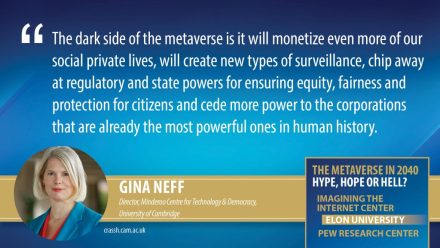 Gina Neff called for a redrafting of fundamental social contracts about trust and democracy, noting that powerful narratives in the metaverse will combine new ways of experiencing social connection with new forms of “trustless trust” from the hundreds of little contracts and exchanges people are asked to enter into every day.
Gina Neff called for a redrafting of fundamental social contracts about trust and democracy, noting that powerful narratives in the metaverse will combine new ways of experiencing social connection with new forms of “trustless trust” from the hundreds of little contracts and exchanges people are asked to enter into every day.- Stephen Downes predicted that in 2040 it will not be possible for most people to distinguish between avatars representing humans and artificial intelligences, adding that there will be “convincing impersonations and worse.”
- Rahul Saxena said he expects a “Super-Metaverse” of tech enhancements that help people augment their work, for instance using imaging and actuators to perform surgeries. But some will choose to live in a “Fantasy-Metaverse” that “prefers gullible consumption over critical thinking,” and he warned that “the shifts to the Fantasy-Metaverse will be like the unleashing of an opium super-epidemic.”
- Alexander B. Howard warned it is possible that a “metaverse could empower authoritarians to track, control and coerce billions of humans in silicon prisons ringed by invisible barbed wire, governed by opaque algorithmic regulation and vast artificial intelligences.”
The full report features a selection of the most comprehensive overarching responses shared by the 624 thought leaders participating in the nonrandom sample, including Avi Bar-Zeev, XR pioneer who has developed the tech at Microsoft, Apple, Amazon, Google and more; Rod Beckstrom, author, entrepreneur and former CEO of ICANN and director at the U.S. National Cybersecurity Center; Stowe Boyd, managing director and founder of Work Futures; Tim Bray, founder and principal at Textuality Services (previously at Amazon); Daniel D. Bryant, Wales-based VR educator, co-founder of Educators in VR; Eric Burger, recently worked in the White House Office of Science and Technology Policy and as the chief technology officer at the FCC, now on the computer science faculty at Georgetown University; Jamais Cascio, distinguished fellow at the Institute for the Future; Cathy Cavanaugh, chief technology officer at the University of Florida Lastinger Center for Learning; Vinton G. Cerf, vice president and chief internet evangelist at Google; David Clark, Internet Hall of Fame member and senior research scientist at MIT’s Computer Science and Artificial Intelligence Laboratory; Barry Chudakov, founder and principal at Sertain Research; Susan Crawford, a professor at Harvard Law School and former special assistant in the Obama White House; Cory Doctorow, activist journalist and author of “How to Destroy Surveillance Capitalism”; Stephen Downes, expert with the Digital Technologies Research Centre of the National Research Council of Canada; Seth Finkelstein, principal at Finkelstein Consulting and Electronic Frontier Foundation Pioneer Award winner; Michael M.J. Fischer, professor of anthropology and science and technology studies at MIT; Mary Anne Franks, president of the Cyber Civil Rights Initiative; Mei Lin Fung, chair of People-Centered Internet; Katie Harbath, public policy director at Facebook from 2011-2021, now founder and CEO of Anchor Change and director of Tech and Democracy for the International Republican Institute; John C. Havens, executive director of the Institute of IEEE Global Initiative on Ethics of Autonomous and Intelligent Systems; Alexander B. Howard, director of the Digital Democracy Project; Christian Huitema, 40-year veteran of the software and internet industries and former director of the Internet Architecture Board; Elizabeth Hyman, CEO for the XR Association; Frank Kaufmann, president of the Twelve Gates Foundation; Jim Kennedy, senior vice president for strategy at The Associated Press; Laurence Lannom, vice president at the Corporation for National Research Initiatives (CNRI); Mike Liebhold, distinguished fellow, retired, at The Institute for the Future; Leah Lievrouw, professor of information studies at UCLA; Sonia Livingston, OBE, professor of social psychology at the London School of Economics and special adviser to the House of Lords’ Select Committee on Communications; Dirk Lueth, co-founder and CEO of Upland; Keram Malicki-Sanchez, founding president of the Constant Change Media Group; Sean McGregor, technical lead for the IBM Watson AI XPRIZE and machine learning architect at Syntiant; Riel Miller, head of foresight at UNESCO; Jacquelyn Ford Morie, VR pioneer and chief scientist at All These Worlds; Andrew Nachison, founder of WeMedia; Gina Neff, professor and director of the Minderoo Centre for Technology and Democracy at the University of Cambridge; Davi Ottenheimer, vice president for trust and digital ethics at Inrupt; David Porush, writer and longtime professor at Rensselaer Polytechnic Institute; Jon Radoff, author of the Building the Metaverse blog and CEO of Beamable; Albert “Skip” Rizzo, director of Medical Virtual Reality at the USC Institute for Creative Technologies; Howard Rheingold, pioneering sociologist and author of “The Virtual Community”; Glynn Rogers, a complex systems and networks researcher; Louis Rosenberg, technologist, inventor, entrepreneur and CEO of Unanimous AI; Marc Rotenberg, founder and president of the Center for AI and Digital Policy; Douglas Rushkoff, digital theorist and host of the NPR One podcast “Team Human”; Melissa Sassi, Global Head of IBM Hyper Protect Accelerator; Rahul Saxena, CEO of CoBot Systems; Doc Searls, internet pioneer and co-founder and board member at Customer Commons; Henning Schulzrinne, Internet Hall of Fame member and co-chair of the Internet Technical Committee of the IEEE; Jim Spohrer, board member of the International Society of Service Innovation Professionals and longtime IBM leader; Marta Szekeres, a complex systems researcher based in Hungary; Brad Templeton, internet pioneer, futurist and activist, chair emeritus of the Electronic Frontier Foundation; David Weinberger, senior researcher at Harvard’s Berkman Center for Internet and Society; Brooke Foucault Welles, associate professor of communication studies at Northeastern University; Kevin Werbach, professor of legal studies and business ethics at the University of Pennsylvania; Steve Wilson, VP and principal analyst at Constellation Research; and Ethan Zuckerman, director, Initiative on Digital Public Infrastructure at the University of Massachusetts-Amherst.
Access the full report from Imagining the Internet or download a PDF of the report from Pew Research.



